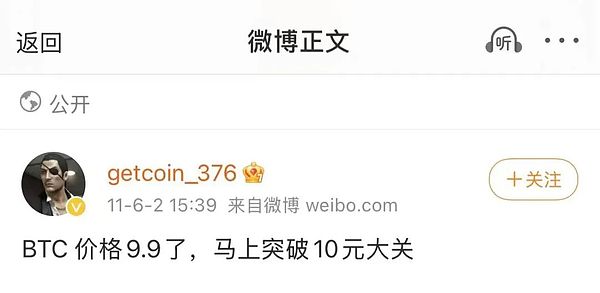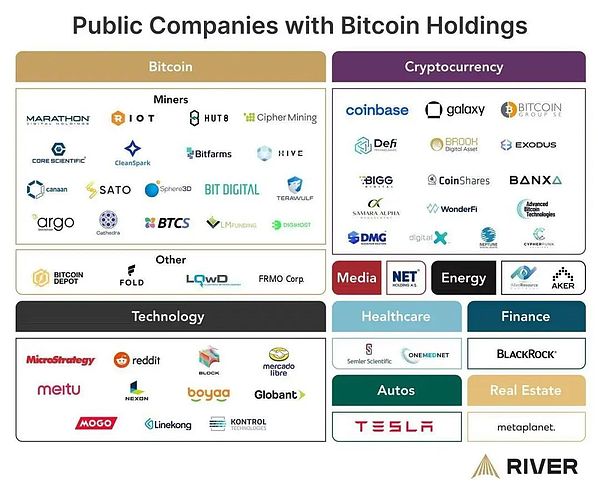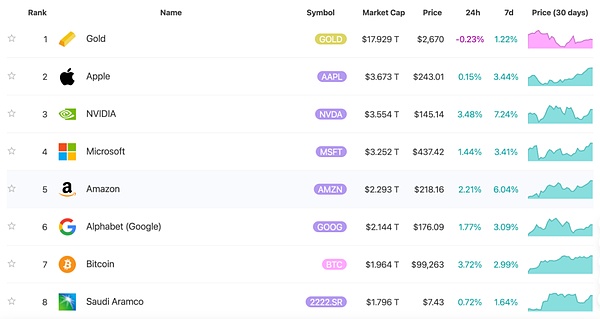Source: TechFlow
At 18:15:05 on January 3, 2009, Satoshi Nakamoto wrote the title of the front-page article of The Times on that day in the Bitcoin Genesis Block: "The Times 03/Jan/2009 Chancellor on brink of second bailout for banks" (January 3, 2009, the Chancellor of the Exchequer is on the verge of implementing a second round of emergency aid for banks).
Who would have thought that this digital asset, born in the shadow of the financial crisis, would break through the historic mark of $100,000 on December 5, 2024, becoming a financial behemoth with a market value of nearly $2 trillion.
From being worthless at first, to exchanging 10,000 bitcoins for two pizzas in 2010; to 2011, early participants cheered that bitcoin was about to break through 10 yuan; to 2017, it broke through 10,000 US dollars for the first time, causing a global sensation, and then in 2024, the Bitcoin spot ETF was approved and landed on the US stock market... This "Internet bubble" that was once sneered at has now become the "digital gold" that Wall Street financial giants such as BlackRock and Fidelity are vying for.

Every transformation of Bitcoin is amazing, rewriting people's perception of currency, value and wealth.
Then the question is, do you hold Bitcoin? Do you hold Bitcoin?
Recently, many traders and practitioners in the crypto industry have received messages like "Congratulations, you have made a fortune recently." At this time, they can only reply awkwardly with "It's okay, it's okay." Others think you are being modest, but you are the only one crying silently.
There are two heartbreaking and unexpected facts: This is a bull market unique to Bitcoin, and most retail investors no longer hold Bitcoin.
Why is Bitcoin the only one that stands out in this cycle?
Top conspiracy
This is a top conspiracy that has been arranged long ago.
Let's go back to 4 a.m. on January 11, 2024, when the U.S. Securities and Exchange Commission (SEC) approved 11 spot BTC ETFs, including BlackRock IBIT.
Perhaps as Wang Chuan said: "The significance of January 10, 2024 in the world's monetary history, looking back in the future, may be comparable to August 13, 1971 (Nixon announced the decoupling from gold) and January 18, 1871 (Germany unified and led European countries and the United States to join the gold standard system within a few years)."
The approval of spot ETFs opened the floodgates for institutional funds to enter the market. From then on, Bitcoin is Bitcoin and other cryptocurrencies are other.
As of November 21, in just 10 months, Bitcoin ETFs have attracted a cumulative inflow of US$100 billion, which is equivalent to 82% of the size of US gold ETFs, and it is only one step away from surpassing.
Bitcoin is no longer a speculative market dominated by retail investors, but is gradually dominated by traditional financial institutions. Whether it is Wall Street financial institutions or listed companies in various countries or even some sovereign governments, a battle for chips is being staged.
The most representative player in this battle is MicroStrategy, a US-listed company.
MSTR's original main business was enterprise analysis software. In August 2020, under the leadership of Chairman Michael Saylor, MSTR announced that it would spend $250 million to purchase 21,454 BTC, becoming the world's first listed company to implement a Bitcoin funding strategy.
MSTR's strategy for buying Bitcoin is to borrow money at an interest rate of about 1% by issuing stocks and bonds to buy Bitcoin. According to disclosures, MSTR has issued about 40 Bitcoin purchase announcements in the past four years.
As of now (December 5), MSTR has held more than 402,100 Bitcoins, accounting for about 1.5% of the total global supply of Bitcoin, making it the world's largest listed Bitcoin holder. MSTR has spent a total of $23.483 billion on Bitcoin, with an average cost of about $58,402, and has a book profit of more than $16.7 billion so far.
On November 20, MSTR's stock price once exceeded $500, and its market value exceeded $100 billion. The trading volume on that day even surpassed the US stock leader Nvidia. Compared with the stock price of about $12 when it began to hoard Bitcoin in August 2020, it has more than doubled 40 times, becoming a big bull stock in the US stock market.
First buy Bitcoin, then issue stocks at a premium to Bitcoin, and then issue bonds with Bitcoin as collateral. When Bitcoin rises, the company's stock price rises, and then issue bonds and stocks to continue buying... Under the demonstration and guidance of MicroStrategy, major listed companies around the world have followed suit. Japanese listed company Metaplanet, US listed medical company Semler Scientific, German listed company Samara Asset Group, Hong Kong listed company Meitu Xiuxiu, Boya Interactive and many other companies have started the Bitcoin purchase and hoarding mode.
Statistics show that more than 60 listed companies are hoarding Bitcoin, and thousands of private companies are following suit.

MSTR CEO Michael Saylor is already one of the most influential Bitcoin evangelists, promoting Bitcoin everywhere.
Michael Saylor will have three minutes to introduce the Bitcoin purchase strategy to the Microsoft board of directors. He previously said that if Microsoft converts part of its cash into Bitcoin every quarter, it can create trillions of dollars of value for shareholders in the next 10 years and increase its market value by hundreds of billions of dollars.
The Bitcoin ETF opened the channel, and MSTR personally bought and brought goods, but the real credit for the recent rapid rise in Bitcoin should be attributed to one person - Trump.
At the Bitcoin 2024 conference in July, Trump publicly promised to make the United States the world's "cryptocurrency capital" and establish a national Bitcoin reserve.

At the end of September, Trump and his three sons, Donald Jr., Eric and Barron, announced their latest venture, World Liberty Financial. The new enterprise, known as the decentralized finance (DeFi) money market platform, launched a proprietary cryptocurrency called $WLFI.
Trump himself also took action and became the "first US president to buy a hamburger with Bitcoin."
Trump's assistant, Vice President Vance, is also a "coin circle person". According to the disclosed personal financial report, as of 2022, he owns $100,000 to $250,000 worth of Bitcoin on the crypto exchange Coinbase.
In addition, one of the biggest contributors to Trump's victory in this round, Musk, the world's richest man, is also a well-known cryptocurrency enthusiast. He pushed Tesla to buy Bitcoin and include it in its financial statements. He is particularly active in supporting Dogecoin, and even established the Department of Government Efficiency (abbreviated as DOGE) in the name of Dogecoin.
During Biden's term, the U.S. Securities and Exchange Commission (SEC), led by Gary Gensler, launched an unprecedented crackdown on the cryptocurrency industry. From suing Ripple to launching a heavy lawsuit against Binance and its CEO Zhao Changpeng; from identifying a large number of crypto tokens as unregistered securities, frequently issuing sky-high fines for various crypto projects to sending threatening letters to Coinbase... The U.S. cryptocurrency market has been shrouded in the shadow of regulation.
Trump's coming to power marks a complete shift in the U.S. cryptocurrency policy, clearing the haze and removing institutional obstacles for the development of cryptocurrency in the United States.
To sum up, the script elements of this top conspiracy were pieced together in various coincidences:
When the United States started a cycle of interest rate cuts, Bitcoin ETF was passed, and Wall Street giants such as BlackRock and Vanguard joined the Bitcoin interest group, leading a large amount of funds to flow into Bitcoin.
MSTR CEO Michael Saylor became the Bitcoin Milk King, constantly borrowing to increase Bitcoin positions, and the price of the currency and stock prices spiraled up, attracting many listed companies to imitate and join the game.
Trump won the election, and the new president of the United States personally endorsed Bitcoin, cleared institutional obstacles, and planned to use BTC as a strategic reserve asset for the United States.
All plans and actions are displayed on the brand, everyone has the opportunity to join, and all participants are profitable... This is the top conspiracy. Through the ETF products led by Wall Street financial giants, the United States is transforming Bitcoin, a decentralized rebel, into a controlled financial instrument.
Perfect narrative
Then the question is, why is it Bitcoin, why can it only be Bitcoin?
The charm of Bitcoin's narrative lies in its simplicity, the fact that it does not require technical delivery and cannot be falsified, like a perfect closed loop, with each crisis strengthening rather than weakening its value proposition.
In 2009, it was born on the ruins of the financial crisis, with the mission of fighting inflation and the banking system; during the 2020 epidemic, countries printed money through unlimited quantitative easing, making Bitcoin's scarcity narrative more shining; in 2022, during the Russian-Ukrainian war, Bitcoin became a weapon in the invisible financial war, explaining what is a super-sovereign currency and once again verifying the importance of decentralized assets; in 2024, the Federal Reserve cut interest rates and geopolitical turmoil intensified, and Bitcoin perfectly played the role of a safe-haven asset.
From the early "digital gold" to the later "super-sovereign assets" and then to the "Web3 cornerstone", every narrative of Bitcoin has been strengthened in reality.
In the crypto world, we have seen too many grand visions and complex technical solutions, but it is precisely the simplest Bitcoin that can stand the test of time. It does not require marketing, roadmaps, or promises of technological upgrades. Its value proposition is as simple and undeniable as the law of gravity: a decentralized, scarce, and immutable value network.
That’s why it can only be Bitcoin. Because in a world full of uncertainty, the most precious thing is certainty. Bitcoin provides just such certainty: definite supply, definite issuance rules, definite operating mechanism.
Challenging Gold
Now that it has crossed the $100,000 mark, the next step for Bitcoin will be to challenge the status of gold.
As of December 5, in the ranking of the top ten assets in the world, gold ranks first in market value, reaching $18 trillion, and Bitcoin ranks seventh in market value with $1.98 trillion, surpassing silver and Saudi Aramco.

Central banks of various countries are one of the core buyers of gold. The continuous black swans of international politics and the turbulent regional situation have driven the demand for gold. In 2022-2023, global central banks have net bought more than 1,100 tons of gold for two consecutive years. They are the largest buyers in the international gold market in the past three years and the main promoters of this round of gold price increases.
In terms of subdivision, European and American countries are net sellers of gold, while emerging countries are net buyers. In order to reduce their dependence on the US dollar system, emerging central banks such as China have increased their holdings of gold and reduced their holdings of US bonds.
The trend of de-dollarization is reshaping the global reserve asset map.
Compared with gold, Bitcoin has disadvantages in cultural consensus and market value, but it also has its unique advantages.
Compared with gold, the supply of Bitcoin is more transparent and predictable, and will never exceed 21 million. After the halving in 2024, the daily increase in Bitcoin will drop to 450, and the annual inflation rate will be only 0.8%. In contrast, the annual output of gold is still around 3,500 tons, equivalent to an inflation rate of 2-3%.
The digital nature of Bitcoin gives it a significant advantage in cross-border transfer and storage management. It does not require a special vault or complex transportation. A cold wallet can store billions of dollars in assets, which is particularly important in times of geopolitical tension.
Bitcoin does not belong to any country, is not controlled by a single government, is easy to transfer, and has a transparent supply. These characteristics make it an ideal supplement to reserve assets.
In the week when Trump won, the total assets of BlackRock's Bitcoin ETF-iShares (IBIT) reached US$34.3 billion, which has exceeded its gold trust fund (IAU). It should be noted that the gold ETF has a history of 20 years.
If Trump really fulfills his promise to use Bitcoin as a strategic reserve for the United States, the significance of this signal will far exceed the actual amount of his purchase. The pattern of the financial system we are familiar with will be rewritten.
Just like the dollar was linked to gold, the US attitude directly determined the fate of the entire Bretton Woods system. Today, the US attitude towards Bitcoin may also trigger a paradigm shift in reserve assets.
We have seen some initial signs. El Salvador took the lead in incorporating Bitcoin into legal tender. Although it is small in size, it has set a precedent; some sovereign wealth funds are also quietly investing in Bitcoin. For example, Singapore's sovereign fund Temasek has invested in a number of cryptocurrency-related companies; Bhutan has actively mined Bitcoin since 2021...
If more countries begin to include Bitcoin in their reserve asset allocation, even if only 1-5% is allocated, the demand for Bitcoin will also have a qualitative leap. You know, the scale of global foreign exchange reserves exceeds 12 trillion US dollars.
Institutional investors continue to absorb market liquidity through ETFs, long-term holders continue to increase, exchange circulation continues to decline, and listed companies hoard Bitcoin. If the sovereign reserve demand is added, the scarcity premium of Bitcoin will be pushed to a new height.
If this is true, there are only 21 million bitcoins, which is bound to be not enough to buy.
 Weiliang
Weiliang
 Weiliang
Weiliang Miyuki
Miyuki Joy
Joy Brian
Brian Miyuki
Miyuki Alex
Alex Miyuki
Miyuki Joy
Joy Brian
Brian Brian
Brian